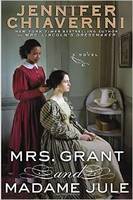
When perusing potential books to read, Mrs. Grant and Madame Jule by Jennifer Chiaverini by grabbed my attention because I spent almost eight years earlier in my life living in the St. Louis area where the novel is partially set. The book’s blurb also states that Julia Dent Grant “had perilously poor vision but was gifted with prophetic sight;” as an intuitive, I enjoy reading books about others with metaphysical gifts. Alas, this book didn't live up to my hopes for it. Grant’s prophetic abilities are occasionally mentioned in the context of dreams she had when they came true, but for the most part, her metaphysical gifts were often no more than a tangential side note.
The novel is clearly rooted in the letters of Julia and Ulysses Grant as well as others in their family, helping to provide historical accuracy. However, the author’s integration of the works is not what one could hope. The narrative seems as though Chiaverini can’t decide if she wants to write history or fiction and thus ends up doing a mediocre job at historical fiction. When the author is writing pure fiction, such as at the beginning novel before the letters begin, her text flows much more smoothly. Later on, the book becomes a very dry history tracing Civil War battles with curt descriptions as the fiction falls victim to history. The characters become very flat and boring; they seem to exist only to help the War progress rather than the War being an event in the lives of interesting people whom the reader wants to know better.
The relationship between Julia and her slave, also Julia but whom she nicknames Jule, seems as though it has a great deal of promise at the beginning of the book. However, as the novel progresses, their relationship falls by the side in favor of battle reports. Jule often seems like an afterthought whom the author has to work in out of duty to her title. Jule's emotions are stereotyped and her character development was lacking. So much more could have been written to help this fascinating woman come to life.
All in all, both Julia and Ulysses Grant end up seeming relatively flat, each with a few good but mostly despicable traits thrown in for good measure. The dialogue between these two often drops to the level of being insipid. Their children often seem as though they are afterthoughts as the two parents place them in boarding schools or leave them with extended family as they constantly travel the nation seemingly as easily and quickly as if modern airlines were available.
Overall, the book might be a great read for a Civil War buff, but as a fan of historical fiction, an intuitive, and a woman who wrote her dissertation on a subset of 19th century American women, I found myself ready for the book to end by the time I had reached the 30% point. The premise behind the book was enticing, but the follow-through just wasn't as good as what I was seeking.
© 2015 Elizabeth Galen, Ph.D., Green Heart Guidance, LLC
 RSS Feed
RSS Feed